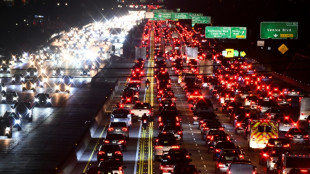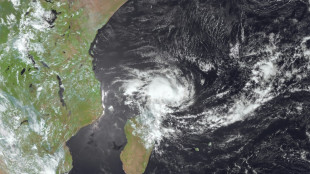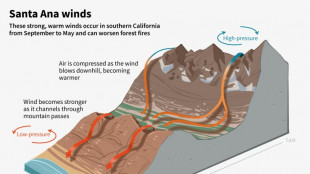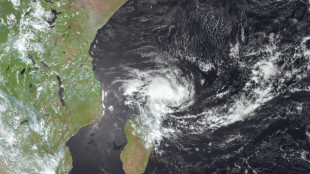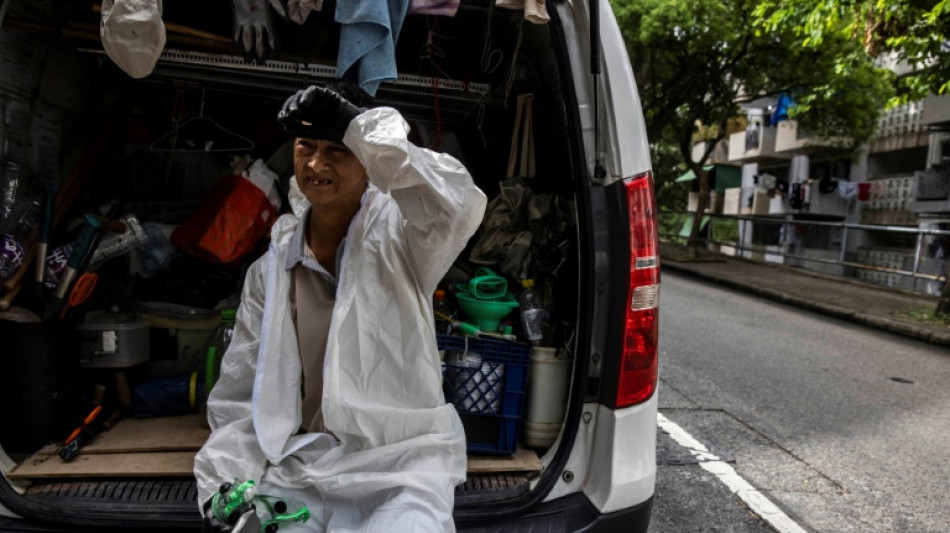
-
 Blasts in Kyiv as UK's Starmer visits to ink '100-year' accord
Blasts in Kyiv as UK's Starmer visits to ink '100-year' accord
-
Hong Kong mogul Jimmy Lai grilled over US, Taiwan ties

-
 Pakistan, West Indies seek to improve from Test Championship lows
Pakistan, West Indies seek to improve from Test Championship lows
-
Trauma and tragedy in the City of Angels: covering the LA fires

-
 Spain raises flag at Damascus embassy after 12-year closure
Spain raises flag at Damascus embassy after 12-year closure
-
Teen star Fonseca out of Australian Open in five-set thriller

-
 Travel agencies say North Korea reopens border city to tourism
Travel agencies say North Korea reopens border city to tourism
-
India's outcast toilet cleaners keeping Hindu festival going

-
 Apple loses top spot in China smartphone sales to local rivals
Apple loses top spot in China smartphone sales to local rivals
-
Sri Lanka signs landmark $3.7 bn deal with Chinese state oil giant

-
 'I had 10 minutes': Lys makes most of Australian Open second chance
'I had 10 minutes': Lys makes most of Australian Open second chance
-
Spanish FM raises flag at Damascus embassy after 12-year closure

-
 Blue Origin's New Glenn rocket blasts into orbit for first time
Blue Origin's New Glenn rocket blasts into orbit for first time
-
UK economy rebounds but headwinds remain for govt

-
 Rice fields turned into art in northern Thailand
Rice fields turned into art in northern Thailand
-
Stocks follow Wall St higher on welcome US inflation data

-
 South Korea's president arrest: what happens next?
South Korea's president arrest: what happens next?
-
Blue Origin's New Glenn rocket blasts off in first launch, reaches orbit

-
 Chinese give guarded welcome to spending subsidies
Chinese give guarded welcome to spending subsidies
-
World Bank plans $20 bn payout for Pakistan over coming decade

-
 Indian Bollywood star Saif Ali Khan stabbed in burglary
Indian Bollywood star Saif Ali Khan stabbed in burglary
-
Taiwan's TSMC says net profit rose 57% in fourth quarter

-
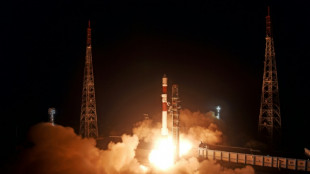 India achieves 'historic' space docking mission
India achieves 'historic' space docking mission
-
South Korea's Yoon avoids fresh questioning after dramatic arrest

-
 Olympic push for kho kho, India's ancient tag sport
Olympic push for kho kho, India's ancient tag sport
-
Dangerous Fritz sets up Monfils clash at Australian Open

-
 AFP photographer's search for his mother in the Nazi camps
AFP photographer's search for his mother in the Nazi camps
-
Life after the unthinkable: Shoah survivors who began again in Israel

-
 Israeli cabinet to vote on Gaza ceasefire deal
Israeli cabinet to vote on Gaza ceasefire deal
-
Jabeur finds it 'hard to breathe' as asthma flares up in Melbourne

-
 Swiatek powers on as Sinner, Medevedev top men's Melbourne bill
Swiatek powers on as Sinner, Medevedev top men's Melbourne bill
-
Nintendo rumour mill in overdrive over new Switch

-
 Biden warns of Trump 'oligarchy' in dark farewell speech
Biden warns of Trump 'oligarchy' in dark farewell speech
-
Superb Swiatek sets up Raducanu showdown at Australian Open

-
 Asian stocks follow Wall St higher on welcome US inflation data
Asian stocks follow Wall St higher on welcome US inflation data
-
Toyota arm Hino makes deal to settle emission fraud case

-
 Fire-wrecked Los Angeles gets a break as winds drop
Fire-wrecked Los Angeles gets a break as winds drop
-
Superb Swiatek races into third round at Australian Open

-
 Biden warns of dangerous 'oligarchy' in dark farewell speech
Biden warns of dangerous 'oligarchy' in dark farewell speech
-
Herbicide under US scrutiny over potential Parkinson's link

-
 South Korea's Yoon to avoid fresh questioning after dramatic arrest
South Korea's Yoon to avoid fresh questioning after dramatic arrest
-
Behind the Gaza deal: a US odd couple and last-minute snags

-
 Noisy racket on Australian Open 'party court' forces match move
Noisy racket on Australian Open 'party court' forces match move
-
AFP strikes deal for France's Mistral AI to use news articles
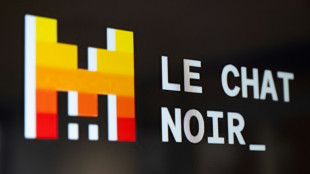
-
 Introducing RUBY-W2: u-blox's first Wi-Fi 7 module for superior Apple(R) CarPlay and Android(R) Auto user experience
Introducing RUBY-W2: u-blox's first Wi-Fi 7 module for superior Apple(R) CarPlay and Android(R) Auto user experience
-
'Sensational' Arsenal back in title race: Arteta

-
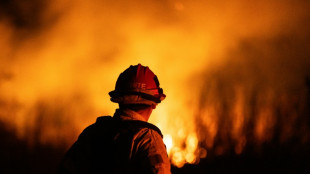 Survivors count the mental cost of Los Angeles fires
Survivors count the mental cost of Los Angeles fires
-
Arsenal reignite Premier League title charge as Isak stars again

-
 Thousands across Gaza celebrate ceasefire deal
Thousands across Gaza celebrate ceasefire deal
-
Postecoglou slams 'nowhere near good enough' Spurs after Arsenal defeat


'In a sauna': Hong Kong's labourers swelter as temperatures rise
Dressed in a full-body protective suit, an elderly pest control worker could last no more than 15 minutes spraying pesticide along a Hong Kong pavement before the summer heat became too much.
"The longer you work, the more it feels like it's raining inside the (suit)... it's just like being in a sauna," said Wah, 63, who asked to be identified only by his first name.
He emerged from his protective clothing drenched in sweat on a scorching August morning, with temperatures soaring to 32.2 degrees Celsius (90 degrees Fahrenheit) and humidity hitting 87 percent.
The month before, Hong Kong saw its third-hottest July on record, with the maximum daily temperature hitting 36.1 degrees Celsius. The top three warmest years in the city's history were all recorded after 2018.
Recently, the government advised employers to let workers take longer breaks on hotter days, but companies say the guidelines fail to consider the needs of different work environments.
Activists argue that without strong regulations, thousands of Hong Kong workers remain vulnerable to heat-related illnesses.
"Temperatures in 2022 broke multiple records, so we felt more support was needed," said social worker Fish Tsoi of Caritas Hong Kong.
She is part of a research team measuring the body temperatures of people toiling under extreme heat, especially the elderly like Wah and his six-person crew.
Last July, a pest control firm saw 20 of its workers quit because conditions were too tough, while 10 were hospitalised with heatstroke, she said.
"This situation did not just appear last year -- it was years in the making," Tsoi said. "Nobody took proactive steps to respond."
- 'Slow' progress -
Temperatures around the world are rising to unprecedented levels, with more frequent heatwaves, which scientists have partly attributed to human-caused climate change.
A city infamous for its intense humidity levels, Hong Kong introduced a heat-stress warning system in May to help employers schedule "appropriate work-rest periods".
It has been issued more than 50 times since then.
Greenpeace campaigner Tom Ng said the "biggest problem" was that employers who ignore the guidelines face no legal repercussions.
"In terms of how climate change affects Hong Kongers, outdoor workers are at the frontlines," he told AFP.
Emily Chan, a public health specialist at the Chinese University of Hong Kong, welcomed the guidelines but agreed more was needed.
She pointed to mainland Chinese cities, including neighbouring tech hub Shenzhen, which mandate work stoppages and subsidies once temperature thresholds are reached.
"(Hong Kong) has been relatively slow in setting up protections," Chan said.
Labour minister Chris Sun said this month that his department had "stepped up inspections" and would issue warnings to employers when needed.
Despite the new system having no legal bite, the government can still sue employers "who just turn a blind eye", he said in May.
Wah, who clocks six-day weeks for $8 an hour, said there is little he can do to avoid heat exhaustion besides operating his machinery in short bursts.
"If you do this for more than half an hour, the human body cannot withstand the temperature," he said.
- 'No recourse' -
In each of the past four years, the city has logged fewer than two dozen cases of heatstroke-related work injuries and no deaths, according to labour officials, but activists dispute those statistics.
"The reality is (heatstroke) is not reported," said Fay Siu, who runs the Association for the Rights of Industrial Accident Victims.
Either the workers do not know they can report it or "the company may not recognise it", she told AFP.
She pointed to a 2018 case when a 39-year-old died after fainting at a construction site. An investigation found rhabdomyolysis -- a potentially life-threatening type of muscle breakdown -- "caused by high temperatures and signs of heatstroke".
"But the insurance company and his employer... pinned it on his personal medical conditions so it would not be categorised as a work injury," Siu said.
Her group has identified at least four cases of outdoor workers dying on days of extreme heat in the past year.
Siu said labour officials should do more to investigate or family members would be left with "no recourse".
In response, the Labour Department said there was no information indicating that workers were unable to report heatstroke-related work injuries, but agreed that cases with "mild symptoms" may go unreported.
"The number of registered cases may be lower than the actual number of symptomatic cases," the department told AFP in a statement.
"Based on the experience of the (department) in processing work injuries suspected to be relating to heat stroke, employers generally do not dispute their liabilities and would make compensation," they added.
For some, the government's new heat-stress warning system appears to have had limited impact.
Wah and his colleagues say they have seen few changes to their routine -- especially since they risk having their pay docked if they are caught taking lengthy breaks.
Chuen, 70, said they usually continue working after a five-minute water break.
"That's how it goes," he said, sweating in the shade.
Y.Nakamura--AMWN
